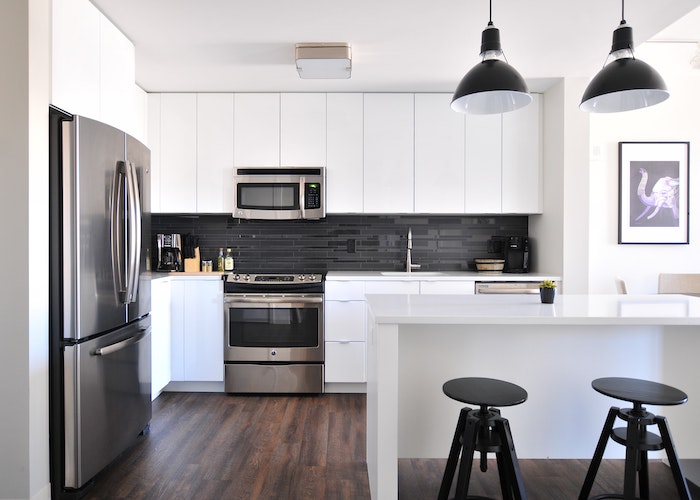5 Easily-Overlooked Things To Beware Of Before Signing Your Apartment Lease

Recently I shared a rather horrific housing experience I underwent. Long story short: I needed to break my lease due to months of unexpected repair work that rendered my entire kitchen unusable. Except my landlady refused to let me do so and instead, hired a lawyer in an effort to intimidate me. Ultimately, I’ve learned a lot about leases—the specific clauses you should double-check, the areas of your lease that are negotiable before signing, and the sections you can compromise on without fear.
Check it out below.
1. Maintenance Plan
Prior to signing your lease, make sure that you and your landlord have a maintenance plan for broken items. This is two-fold: it involves (1) making sure that if an appliance, like the microwave, doesn’t work, the landlord will replace or fix it within thirty days (typically). This applies to all non-essential appliances, for instance even your washing machine and dryer since, technically speaking, you could do your laundry elsewhere. But for your lease, your landlord should still ensure that this is fixed or replaced within 30 days. At this time, you can also discuss how your landlord will go about replacing or repairing these items.
For example, does he/she have a repairman that will need to coordinate with you to enter the premises? Or does that person have their own key that you should be aware of? Will you need to find someone on TaskRabbit to do the job? None of these details need to be present in your lease, but I think it helps to discuss it before signing.
And (2) if any repairs render your unit uninhabitable, for instance, you lose access to running water or a functional toilet, what does your landlord plan to do? My lease had written in that my landlord would come up with a plan within 48 hours to address the issue. While this is OK, other leases I’ve seen since, and the new lease I negotiated, included a clause that allows me to break my lease if any part of the unit were uninhabitable due to repairs. This section of the lease is extremely negotiable, in my opinion, so feel free to push back if you’re not comfortable with what your landlord proposes.
2. Breaking Your Lease
Every lease should include a section about leaving before the end of your lease term. This may include a fee for breaking your lease, which could mean losing your security deposit or paying just one to two months of rent as opposed to the rent you are meant to pay for the entire duration of your lease. This section could also include any agreements surrounding subleasing your place, so for instance, if I needed to leave my apartment due to a family health emergency, I could find another person to take over my lease. Sometimes, your landlord will want to interview the person you are subleasing to and ensure that their credit score and background check pan out before agreeing, so you should discuss this with your landlord before signing so you know what to look for if this situation arises. Other times, though, the person subleasing your place may just be responsible for paying rent directly to you, and you continue to pay your landlord until the end of the lease term. Or your landlord may not allow subleasing at all, and in doing so unknowingly, you may risk getting in trouble.
Either way, figure out how you can leave if you ever so need to, and what those repercussions may be. This section of the lease is negotiable, up until a point, since oftentimes the landlord will want to ensure that they receive payment through the end of the lease term. But overall, I highly recommend would-be-tenants be firm that they have an out beyond just being responsible for rent through the end of your term.
3. Security Deposit
While having a security deposit is a non-negotiable, you can negotiate how much of the security deposit your landlord retains. Although 1-2 months of rent is typical, I was able to negotiate a lower fee given the current housing market. Moreover, specify both how you will pay the security deposit and how you will receive it, including the date as different states have different laws surrounding when your landlord is required to return your security deposit.
4. Notice Period
Most leases abide by a thirty-day notice period, but I’ve certainly come across some with 45, 60, or 90 days. I’d argue that thirty days is more than sufficient, however, so I’d negotiate for this lowered amount, simply because knowing 60 to 90 days in advance that you’re planning to move isn’t always feasible. If you know you want to renew your lease then this is OK, but at some point, or the other, you’re likely to move and it’s simply better to have a shorter notice period, as a result.
5. Concessions
Normally, concessions rarely enter a lease agreement but in the current housing market, I figured it would be important to mention. In large cities, like NYC or San Francisco, rent prices have been dropping steadily. In an effort to maintain price parity, most landlords are keeping their rent prices roughly the same and offering 1-2 months of free rent, instead, making your effective rent over the course of your lease term much less than what you’d originally pay. Your lease should clearly outline the stipulations of these concessions.
For instance, if you are receiving a month of free rent and then paying a higher rate afterward, it should outline that—and mention if your landlord is only offering you the concessions if you fulfill the duration of your lease term, or not. Otherwise, if your landlord just wants to receive the lower payment amount with a month of free rent included in that calculation, your lease should specify that, as well. In the recent legal battle I fought with my landlady, she tried to get me to repay my month of free rent even though the lease didn’t outline any stipulations with that free month, so having this written into my lease was crucial.
***
Ultimately, you should read your lease carefully before signing. Once you’ve lived in a few different homes in the same city or state, you’ll begin to notice what a standard lease looks like. I’d recommend trying to live in a managed property space to start, as they use a standard lease for all the units in their apartment complex. This will allow you to compare and ensure that you’re not losing out on any lease you sign with a single landlord or landlady and I’d also recommend you go with your gut. If you’re not getting the right vibe from your landlord, you might be better off elsewhere since, believe me, legal trouble with your landlord just isn’t worth it.
Keertana Anandraj is a recent college grad living in San Francisco. When she isn’t conducting international macroeconomic research at her day job, you can find her in the spin room or planning her next adventure.
Image via Unsplash




